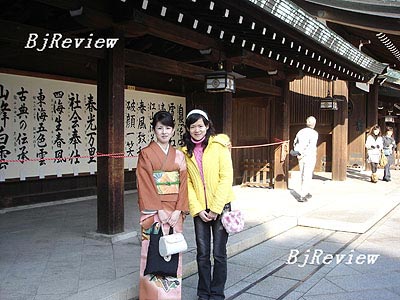Chinese and Japanese citizens have found themselves inextricably linked by strong cultural bonds. This is evident from the interviews conducted by Beijing Review reporters Zhang Yuying and Miao Xiaoyang. They spoke to Yu Qiang, a Chinese writer who has been devoted to promoting China-Japan friendship and cultural exchanges for the past two decades; Weng Xianxian, a graduate student at the Beijing-based Renmin University of China; and Goro Yotsumoto and Shoji Hanamura, Japanese students at Capital Normal University in Beijing.
Yu Qiang
Premier Wen Jiabao's visit to Japan will be an ice-breaking tour. I feel greatly encouraged. The relationship between China and Japan can be likened to a ship sailing on the vast sea. When the sea is calm, passengers on the ship are at ease. When it becomes turbulent, they feel uncomfortable or even utter bitter complaints. The relationship can also be likened to the boundless sky. When the weather is fine and the sun is shining, people are in high spirits. When there are dark clouds and chilly gusts, they are overwhelmed with distress.
I was regretful and concerned about the strained China-Japan relations in recent years. Some of my Japanese friends also showed concern in their letters. In this context, the Shanghai International (China-Japan) Poem Recital that I initiated had to be canceled because of the small registration in 2005 and 2006. Since the China-Japan relationship has taken a turn for the better, I often receive letters from Japanese friends asking me to reopen the recital. The friendly ties between the Chinese and Japanese are long-lasting and cannot be severed.
It is the common aspiration of the two nations to pass on their friendly relations from generation to generation. I believe Premier Wen's trip will help create a pleasant climate for bilateral relations.
Weng Xianxian
Before I visited Japan under a study program in January this year, I had learned about Japan mainly from TV shows, cartoons and books. This program gave me an opportunity to see this traditional yet modern country with my own eyes.
What impressed me most during my 20-day stay was Japan's seamless combination of traditional culture and modern civilization. Take a walk along a busy street and you will find towering skyscrapers and quaint teahouses alike. The Japanese nation's eagerness to learn and openness have helped shape a distinctive culture characterized by tolerance and inclusiveness. I was also impressed by the thoughtfulness and courtesy of the Japanese people. For example, there are special lanes for visually impaired people in the streets. In buses and subway trains, there are seats reserved for the disabled. People working in service industries are extremely polite to their customers. Whenever we were in need, those around us would give us a helping hand. Moreover, garbage cans are found in every nook and cranny of Japanese cities. In Japan, all types of rubbish are classified, treated and recycled. With a strong sense of environmental protection, the Japanese see great value in using resources efficiently.
Despite its brevity, my experience in Japan was really thought-provoking. At the same time, it awakened me to the problems in bilateral relations such as Japan's evaluation of its wartime history. But I am confident that our two nations can resolve the problems by strengthening mutual exchanges and bringing into full play the talents of the young people. As I familiarized myself with Chuo University, where I did my studies, and some Japan-China friendship organizations in Japan, I came to realize the importance of communication, which I think will enable us to dispel misunderstanding, draw on each other's strong points and achieve win-win results.
Goro Yotsumoto
I am a civil servant with the Japanese Coast Guard, sent to study in China by the Japanese Government. Given the frequent exchanges between Japan and China these days, Japan's Coast Guard has a number of cooperative programs with China's Ministry of Public Security and Ministry of Communications, so we need staff members who have good Chinese skills and know China well. That's why the Japanese Government sends some of its employees to study in China every year. After completing their studies, they will return to Japan and work with China.
I think Premier Wen's coming trip is of great importance to bilateral relations. It will be another visit paid by a Chinese premier to Japan after a seven-year break. It indicates that the Japan-China relationship is developing in the right direction. As the two countries improve their political ties, I believe our cooperation on various fronts will make great strides.
Shoji Hanamura
Today, more and more Japanese students want to study in China. With a keen interest in Romance of the Three Kingdoms, some have come to study classical Chinese literature. Some who started to practice calligraphy in their childhood have come to study Chinese calligraphy. Some are martial arts fans who have come to study Chinese kungfu. Others, like me, have come to learn the Chinese language in the spirit of promoting Japan-China exchanges.
Before I came, I worked in the food trade between Japan and China. I will continue to work in the trade sector in Beijing after I finish my studies. The Chinese culture and lifestyle are highly attractive to the Japanese. Although the Chinese currency has appreciated, the cost of living in China is not high.
The rifts in Japan-China relations were exposed in the recent past. However, since Prime Minister Abe visited China in October last year, bilateral relations have been improving. Premier Wen's visit to Japan this April is a much-anticipated event in both Japan and China. I think high-level visits between the two countries will promote their economic cooperation and people-to-people exchanges. As they expand their cooperation in business, culture and science and technology, more and more Japanese will come to study and work in China.
(Beijing Review April 10, 2007)




